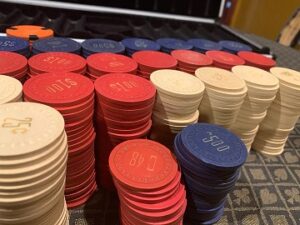This is Faith in Play #78: Stakes, for May 2024.
In my book Why I Believe I wrote, “Tests are merely games, and if you go into them thinking of them as games and relax and enjoy playing, you will perform better. What makes people nervous is not the game but the stakes.” I had that rattling around in my head as I was re-reading Faith and Gaming: Mechanics–I re-read a lot of my old material to help me focus on new ideas, and it seems to have worked this time, because I realized that one thing games generally have in common that I had failed to consider was stakes, that is, something is at stake.

As with many rewards concepts, there are often two aspects of this–the one, what do you receive if you succeed, the other, what does it cost if you lose? We see that clearly in casino games, such as poker or blackjack or roulette: the player has money on the table, and hopes that the money he risks will win him more money, while he knows that if he loses the money he has risked is gone. There was an episode of Matlock in which he was investigating a crime connected to a casino, and on his first day as he went to bet a dollar someone from the casino told him where to bet it. He won, and later he returned and bet the entire winnings, again as directed, and again winning. He continued doing this until the case was over and the crime solved, at which point he once more bet all his winnings as directed by his guide–and lost. Shocked onlookers asked him, “How much did you lose?” and with a bit of sadness in his voice, he answered, “A dollar.”
Perhaps we confuse that which we risked and lost with that which we failed to win. Yet in accounting there is something called opportunity costs. For a simple financial example, imagine that you have a hundred dollars and you put it in a savings account with a two percent return annually. In one year you will have one hundred two dollars. Suppose, though, an advisor suggested that you put your hundred dollars in a certain fund which he correctly predicts will return twelve percent, and you did not take his advice. Had you done so, you would have had one hundred twelve dollars–ten dollars more than you do. That ten dollars, the money you did not earn by choosing the other investment, is an opportunity cost, what it cost you for not taking that opportunity. The stakes in the game include the cost of losing and the gain of winning, but also the cost of not taking the risk at all.
Stakes are essential to motivation. In my mark Joseph “young” web log post #132: Writing Horror (available in French as Maîtriser l’Horreur thanks to Places to Go, People to Be) I note that for horror to work the reader or player must have something at stake. In play we sometimes threaten the life of the player’s character, but this only works if the player is invested in that character. Alternatively, we try to get the player invested in protecting some other character–usually a child or a vulnerable woman. The critical thing is that horror only works if something is at stake.
That proves to be true for most stories. Adventures generally have what Hitchcock called the Maguffin, the thing in the story that everyone wants, whether it’s the Ark of the Covenant or the Dial of Destiny. Even in romances the stakes are whether or not the characters are going to find true love. In short, something has to matter, or the game doesn’t matter. Even in penny poker, even in games played for matchsticks, there are stakes, something to be won, something to be lost, even if it is no more than the pride of winning. In our modern Olympics the winners are given medals of gold, silver, and bronze, whose value far exceeds that of their metallurgical content because they are unique. The original games held in ancient Greece awarded wreaths made from woven strands of laurel, a physical prize which would decay faster than the athlete himself, but which came with the admiration of the people. Something was at stake.
Some say that life is very like a role playing game, that we have our parts and attempt to be what we think we should be. Decades ago I heard someone speaking about one of Jesus’ parables, and he said that there were a lot of things in life that he could do that he wasn’t going to do, because in the end he wanted to hear Jesus say, “Well done, good and faithful servant.” Those were the stakes.
In running our games, we need to be mindful that there have to be stakes for the players, but we also need to be mindful that games are part of life, and we have to be mindful of the stakes in life as well.
